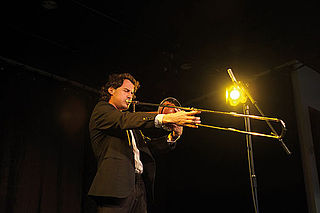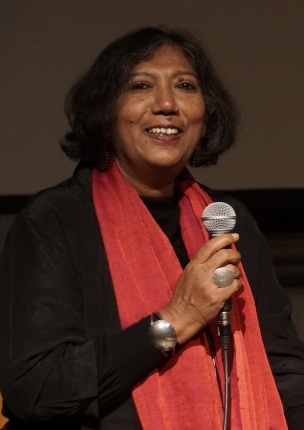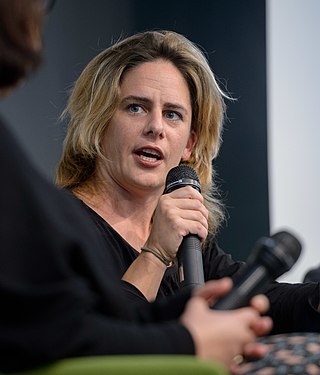
Peter Weibel was an Austrian post-conceptual artist, curator, and new media theoretician. He started out in 1964 as a visual poet, then later moved from the page to the screen within the sense of post-structuralist methodology. His work includes virtual reality and other digital art forms. From 1999 he was the director of the ZKM Center for Art and Media Karlsruhe.

JazzFest Berlin is a jazz festival in Berlin, Germany. Originally called the "Berliner Jazztage", it was founded in 1964 in West Berlin by the Berliner Festspiele. Venues included Berliner Philharmonie, Haus der Kulturen der Welt, Volksbühne, Haus der Berliner Festspiele and the Jazzclubs Quasimodo and A-Trane.

The Haus der Kulturen der Welt (HKW), in English House of World Cultures, in Berlin is Germany's national center for the presentation and discussion of international contemporary arts, with a special focus on non-European cultures and societies. It presents art exhibitions, theater and dance performances, concerts, author readings, films and academic conferences on Visual Art and culture. It is one of the institutions which, due to their national and international standing and the quality of their work, receive funding from the federal government as so-called "lighthouses of culture", from the Federal Minister of State for Culture and the Media as well as from the Federal Foreign Office. As a venue and collaboration partner, HKW has hosted festivals such as the transmediale, curatorial platforms, biennials such as the Berlin Documentary Forum, and mentorship programs such as Forecast. Since 2013, its interdisciplinary elaboration on the Anthropocene discourse has included conferences, exhibitions, and other artistic formats performed together with philosophers, scientists, and arstists, such as Bruno Latour and Hans Joachim Schellnhuber.

Mangelos was a Yugoslavian artist, curator and art critic whose artistic production included handmade books, sculptures and paintings. His work and research contributed greatly to the development of abstract art in Croatia.

The Berlin International Film Festival, usually called the Berlinale, is a major international film festival held annually in Berlin, Germany. Founded in 1951 and originally run in June, the festival has been held every February since 1978 and is one of Europe's "Big Three" film festivals alongside the Venice Film Festival held in Italy and the Cannes Film Festival held in France. Furthermore, it is one of the "Big Five", the most prestigious film festivals in the world. The festival regularly draws tens of thousands of visitors each year.
Siegfried Zielinski is a German media theorist. He held the chair for Media Theory: Archaeology and Variantology of the Media at Berlin University of the Arts, he is Michel Foucault Professor for Techno-Culture and Media Archaeology at the European Graduate School in Saas Fee, and he is director of the International Vilém-Flusser-Archive at the Berlin University of the Arts. In 2016 until March 2018, he succeeded Peter Sloterdijk as head of the Karlsruhe University of Arts and Design.
Paola Yacoub is an artist based in Berlin and Beirut.

The Berlin Documentary Forum (BDF) was a biennale held at the Haus der Kulturen der Welt in Berlin. Interdisciplinary in orientation, it engaged with the 'documentary’ across the fields of film, photography, contemporary art, performance, architecture and cultural theory.

Anton Vidokle is an artist and founder of e-flux. Born 1965, Vidokle lives in New York and Berlin.
Kathy Rae Huffman is an American curator, writer, producer, researcher, lecturer and expert for video and media art. Since the early 1980s, Huffman is said to have helped establish video and new media art, online and interactive art, installation and performance art in the visual arts world. She has curated, written about, and coordinated events for numerous international art institutes, consulted and juried for festivals and alternative arts organisations. Huffman not only introduced video and digital computer art to museum exhibitions, she also pioneered tirelessly to bring television channels and video artists together, in order to show video artworks on TV. From the early 1990s until 2014, Huffman was based in Europe, and embraced early net art and interactive online environments, a curatorial practice that continues. In 1997, she co-founded the Faces mailing list and online community for women working with art, gender and technology. Till today, Huffman is working in the US, in Canada and in Europe.

Madhusree Dutta is an Indian filmmaker, author and curator.

Guillaume Cailleau is a French artist, filmmaker and producer whose interest lies in exploring new forms to address political and social issues.
Thom Kubli is a Swiss-German composer and artist known for installation art and sculptures that often deploy sound as a significant element, using digital technologies and material configurations that increase the viewers' spatial perception.

LaTurbo Avedon is an avatar artist, curator, the designer and founder of Panther Modern. Their work emphasizes the practice of nonphysical identity and authorship since 2008–2009. They have explored the growing relationship between users and virtual environments. They create this body of work using the simulation tools of the current moment. The genesis of their identity occurred in various profile creation processes, eventually taking a more rigid form in Second Life.
Hila Peleg is an international curator and filmmaker and the Dean of HaMidrasha – Faculty of the Arts starting September 2023. Peleg has curated solo shows, large-scale group exhibitions and interdisciplinary cultural events across the visual arts, film and architecture, in public institutions throughout Europe and internationally. She is also known for her documentary film work including her award winning feature film "A Crime Against Art" from 2007 and "Sign Space" from 2016.

Margarita Tsomou is a Greek-German dramaturgist, curator, performance artist, dancer and activist. She is an editor of pop feminist Missy Magazine, professor for contemporary theatre praxis at Osnabrück University of Applied Sciences and curator for theory and discourse at theatre and performance center Hebbel am Ufer in Berlin.
Maha Maamoun, is an Egyptian award-winning visual artist and curator based in Cairo. She is a founding board member of the Contemporary Image Collective (CiC), an independent non-profit space for art and culture founded in Cairo in 2004. She also co-founded the independent publishing platform called Kayfa-ta in 2013. She was awarded the Jury Prize for her film Domestic Tourism II at Sharjah Biennal 9 (2009). Maamoun is a fellow of the Academy of the Arts of the World.
Rasha Salti is a researcher, writer, producer, and curator of art and film. She lives and works between Beirut and Berlin. Salti co-curated many film programs at public institutions, including ArteEast, Lincoln Center and Museum of Modern Art in New York, and collaborated with film festivals as a programmer, such as the Abu Dhabi International Film Festival and Toronto International Film Festival. Since 2017, she is the commissioning editor for La Lucarne at ArteFrance, a program dedicated to Auteur documentaries. Her curatorial projects were exhibited at numerous international public institutions, including Barcelona Museum of Contemporary Art, Haus der Kulturen der Welt in Berlin, Museo de la Solidaridad Salvador Allende in Santiago de Chile, the Sursock Museum in Beirut.
Anselm Franke is a German curator, and writer. He was the head of Visual Art and Film at the Haus der Kulturen der Welt from 2013–2022.
Jocelyn Robert is a Canadian post-modern interdisciplinary artist from Quebec City, Quebec. In 1993, he co-founded the collective Avatar in Quebec City, which became the province's flagship in sound and electronic art. He was its first President and from 2004 to 2009 its artistic director. He also participated in the founding of the Méduse cooperative.











